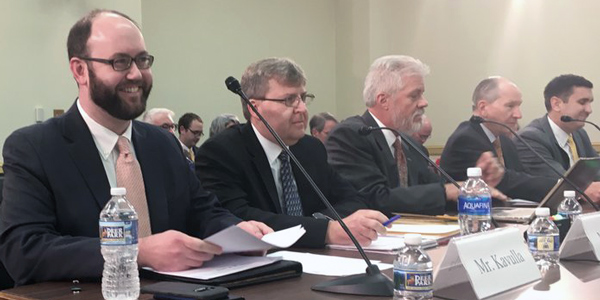By Michael Brooks
A House Energy and Commerce Committee panel Friday heard testimony from federal officials and stakeholders on Republican legislation to expand LNG exports and revise the Public Utility Regulatory Policies Act. Support for the bills, introduced late last year, fell along party lines at the hearing.
PURPA Modernization
The PURPA Modernization Act of 2017 (H.R. 4476), introduced by Rep. Tim Walberg (R-Mich.) in November, would substantially reduce the number of PURPA qualifying facilities from which utilities would be forced to buy power.
Currently, QFs of 20 MW or larger are presumed to have nondiscriminatory access to the wholesale competitive markets and are thus ineligible to invoke utilities’ must-purchase obligation. The bill would reduce this threshold to 2.5 MW.
It would also make it harder for QF developers to game FERC’s 1-mile rule — the presumption that QFs located 1 mile or more apart from each other are separate facilities — by making that presumption rebuttable.
State regulators also would be allowed to exempt utilities from having to purchase from QFs if they determine that the utilities have no need for their power, or if utilities use integrated resource planning and conduct competitive procurement processes.
The provisions in the bill mirror solutions that critics suggested at a subcommittee hearing in September. (See Witnesses Offer Alternate Realities on Need for PURPA Reform.)
Testifying on behalf of the National Association of Utility Regulatory Commissioners, Montana Public Service Commission Vice Chairman Travis Kavulla praised the bill. “This legislation is an important and significant leap forward in providing us with the ability to secure a reliable and affordable energy future for the nation,” he said.
Kavulla said PURPA forces state commissions to essentially guess a utility’s avoided costs, which usually results in overstated rates. Responding to a question by Rep. Bill Flores (R-Texas), Kavulla said, “The smaller the consumer base of the utility, the greater the potential magnitude of erroneous price forecasting from the regulator would be.” In the case of small municipalities and cooperatives, the city or county councils that regulate them “are probably even in less of a good position than I am to try to guess about the future market prices of energy for the purpose of establishing a rate.”
Karl Rabago, executive director of the Pace Energy and Climate Center, said the bill “proposes three significant and problematic changes to PURPA and should be rejected in favor a more measured and competition-friendly approach to addressing perceived concerns about electricity markets.”
“The real problem today is the need for modernization of the utility business model that is now more than 100 years old,” Rabago said.
LNG Exports
The Unlocking Our Domestic LNG Potential Act (H.R. 4605), introduced by Rep. Bill Johnson (R-Ohio), would amend the Natural Gas Act of 1938 to eliminate the Department of Energy’s role in approving requests to export and import gas. The NGA requires the department to determine whether import/export agreements are in the public interest before approving them. Trades with countries that have free-trade agreements with the U.S. are automatically considered in the public interest.
The bill leaves intact FERC’s jurisdiction over siting LNG terminals, as well as the president’s power to prohibit trade with countries under U.S. sanctions.
Republicans repeatedly emphasized the need to capitalize on the country’s supply of natural gas.
“We literally have more natural gas production capability in the United States than we know what to do with,” Rep. Joe Barton (R-Texas) said. The legislation “is simply an acknowledgement of that and says, ‘let’s use this economic resource that we have to benefit the rest of the world and create more economic benefit in the United States.’”
Democrats were less enthusiastic.
“I fail to see the need for almost any of the policy changes,” said Rep. Frank Pallone (D-N.J.), ranking member of the subcommittee. The bill “removes longstanding consumer protections and prevents DOE from ensuring exports of liquefied natural gas to non-free-trade-agreement countries are consistent with the public interest.”
So was Paul Cicio, president of the Industrial Energy Consumers of America, who said domestic gas supplies are not as abundant as commonly thought. Increased LNG exports could harm U.S. consumers by raising prices, he said. He called DOE studies used to determine whether trades with non-FTA countries were in the public interest “woefully inadequate.”
Cicio’s claims about the amount of domestic supply were challenged by Charlie Riedl, executive director of the Center for Liquefied Natural Gas, who said Ohio alone added 5 Tcf of proved reserves in 2016. (See No Agreement on Tipping Point for LNG Exports.)
“When we talk about a supply situation, it’s driven by market demand,” Riedl said. “As market demand continues to increase, we’re able to respond to that with supply.”
The other members of the panel, including those who only came to testify on the PURPA bill, agreed that there was no short-term threat to gas supply.
Steven Winberg, DOE assistant secretary for fossil energy, told the subcommittee that the Trump administration has taken no position on the bill. President Trump, however, has repeatedly emphasized expediting LNG exports, and Energy Secretary Rick Perry and EPA Administrator Scott Pruitt have traveled abroad to promote U.S. natural gas.





